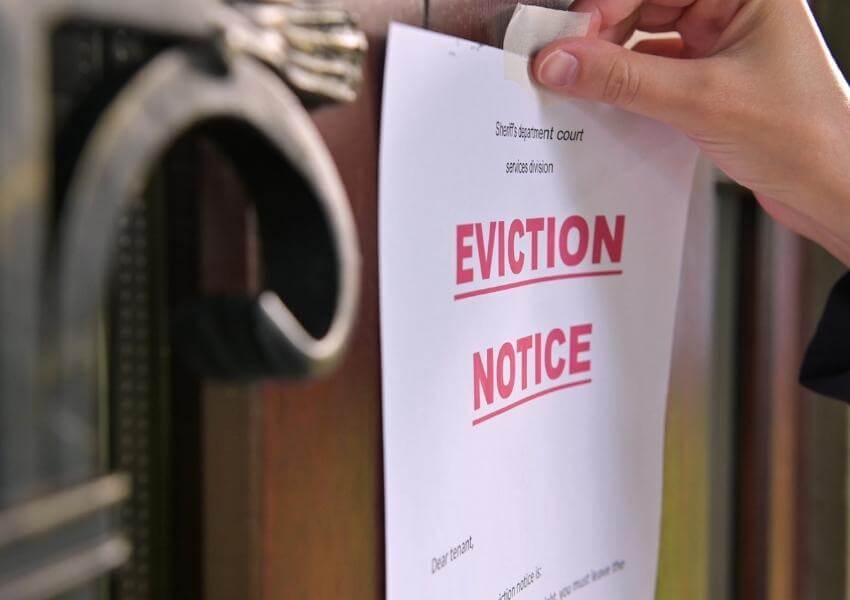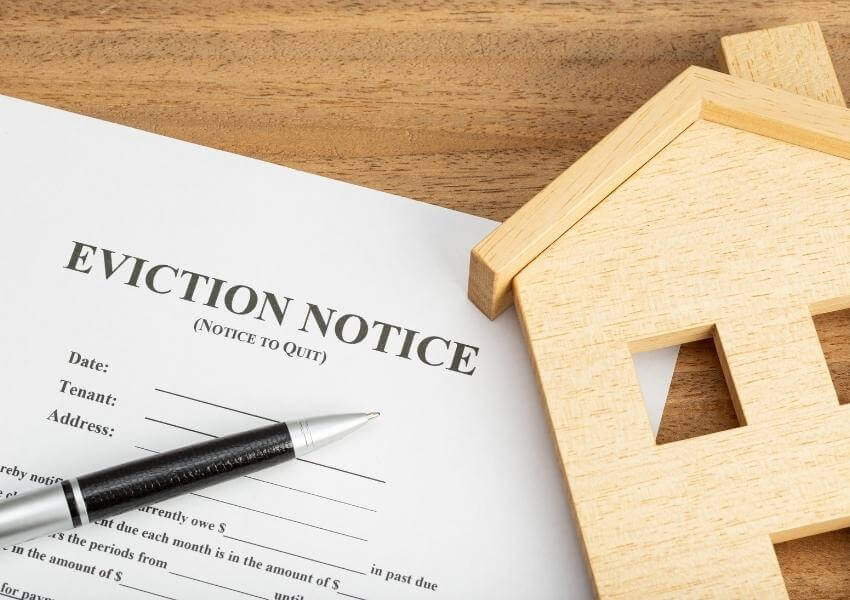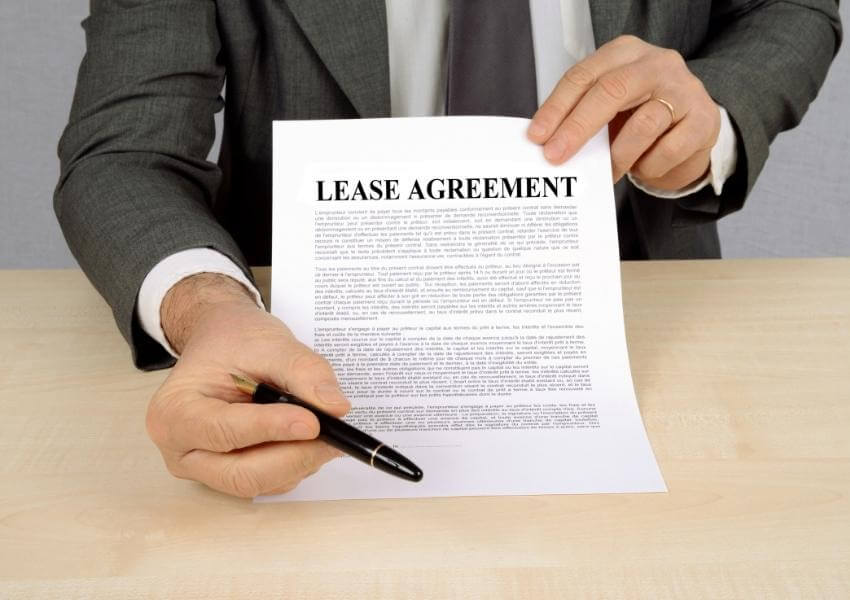
Georgia eviction laws allow a landlord to evict tenants under certain circumstances, such as failing to pay rent or committing a lease violation. It goes without saying that you must follow the proper steps for the eviction in Georgia to be successful. You want to avoid potential legal complications whenever you can.
Below is an overview of the Georgia eviction procedures.
What’s the Process in Georgia? Here's a Guide
Georgia landlord-tenant law outlines the legal process that landlords and residential property managers must follow when evicting their tenants. The following is a basic overview of the Georgia process timeline.
Step #1: Serving a Proper Notice for Lease Termination
To begin the typical eviction process according to Georgia landlord tenant law, the landlord will need to terminate the lease or rental agreement on the rental property by serving the tenant written notice of eviction. A verbal notice will not be enough legally, so it is the landlord's responsibility to create a written one. The written eviction notice informs the tenant to either fix the problem to avoid eviction, such as paying the rent owed, or vacate within a certain notice duration.
The written notice must contain certain information for it to be valid:
- The date.
- The full name of the tenant.
- The address of the residence.
- Reason for the eviction notice, such as the specific lease violation.
- The amount of overdue rent (if the eviction is due to failing to pay rent) and when it needs to be paid.
- The time the tenant has to either fix the lease violations or vacate.
- A statement indicating how you, the landlord, served the formal eviction notice to the tenant.
Nonpayment of Rent
Of course, nonpayment of rent is grounds for eviction. Georgia laws consider rent to be late a day after it’s due. If a tenant refuses or a tenant fails to pay, their landlord can evict a tenant and take back the rental property.
To begin the eviction process in Georgia against the tenant for unpaid rent, the landlord must first serve them a written notice.
Unlike most other states, Georgia's eviction laws don’t specify any specific notice periods to give a tenant for eviction proceedings. For best practice, though, allow the tenant at least 3 days written or verbal notice before moving to the appropriate court to file a lawsuit. This will be easier for all parties involved.
If the three days pass after the landlord files a lawsuit and the tenant hasn't paid or moved out, they may initiate proceedings to have the tenant evicted.
Violation of Lease Agreement
A landlord can evict a tenant in Georgia if the tenant violates their lease agreement.
The following are some examples of usual rental agreement violations can allow a landlord to begin the court process:
- Failing to comply with the occupancy limit stated in the rental agreement.
- Having unauthorized pets when there is a no-pet policy stated in the lease terms.
- Smoking inside the unit when there is a no-smoking policy.
- Subletting the rental unit to another person without the landlord’s permission.
- Making alterations to the property when the lease forbids it.
- Causing excessive property damage to the rental premises.
- Engaging in illegal activities in the rental premises, such as drug use.
Again, Georgia doesn’t specify the amount of notice to serve the tenant prior to filing an eviction action. However, once the notice period the landlord has given them lapses, they may proceed with the Georgia eviction process and get started on the legal fees.
Continuing to Stay After the Lease has Expired
This is another just cause for eviction in the state of Georgia. A tenant who continues to stay after their lease has expired is known as a ‘holdover’ tenant. A landlord must serve them a notice before evicting them. If a tenant does pay the owed rent, the eviction hearing cannot proceed.
Specifically, landlords must serve them a 60 days notice. This is regardless of the type or the length of tenancy. If the tenant doesn’t move out within the 60 days, landlords can continue with the removal process.
Step #2: Serving a Complaint and Summons
If the tenant doesn’t move out within the notice period, a landlord can move to court and file an eviction lawsuit.
In Georgia, an eviction lawsuit is also called a dispossessory action. Fees for having the lawsuit filed in court can range between $60 and $75 depending on the county where the property is located.
After successfully filing the complaint, either a magistrate’s judge or clerk may issue the summons and serve them to the tenant.
After being served an affidavit, the tenant will have to respond within seven days. If they don’t respond within seven days of the affidavit, the court will rule in the landlord's favor by offering a default judgment.
If the tenant does file an answer to the affidavit with the court after recieving their summons, the court will set a court hearing date. The tenant may claim that the eviction is unwarranted. Common tenant defenses to evictions include:
- The landlord tried to evict them on their own by shutting down utilities, locking them out, or removing their belongings from the rental unit.
- The landlord discriminated against the tenant on the basis of their race, color, nationality, or any other protected class.
- Eviction charges were falsified by the landlord.
- The eviction was retaliatory after the tenant exercised any of their legal rights, such as joining a tenants’ union.
- The landlord failed to follow the proper eviction process.

Step #3: Posting a Writ of Possession
After the landlord wins the eviction case, the court will issue the landlord a Writ of Possession. A writ of possession is an order from the court giving possession of the property back to the landlord.
The writ of possession directs the constable or sheriff to take control of the premises and give it back to the landlord.
Usually, this writ is issued by the court after 7 days of the judgment. Georgia law does not state how quickly the eviction must be done after the writ of possession is issued. Typically, it takes anywhere between a few days to a few weeks.
Conclusion
Keeping up to date with all the laws surrounding property ownership is important, but also challenging for both the landlord and tenant.
Get in touch with Vineyard Property Management. We are a quality Marietta management company that understands Georgia law and other aspects of being a landlord. Not only can we help keep your Marietta property legally compliant by following the proper legal procedures for eviction in Georgia, but we can get great, responsible tenants in your unit and offer reliable service for your property, such as advertising, tenant screening service, property maintenance service, specialised rent collection service, and more.
Disclaimer: This article does not constitute legal advice from a qualified eviction attorney or legal professional. Also, laws change often, and this content may not be updated at the time you read it.


